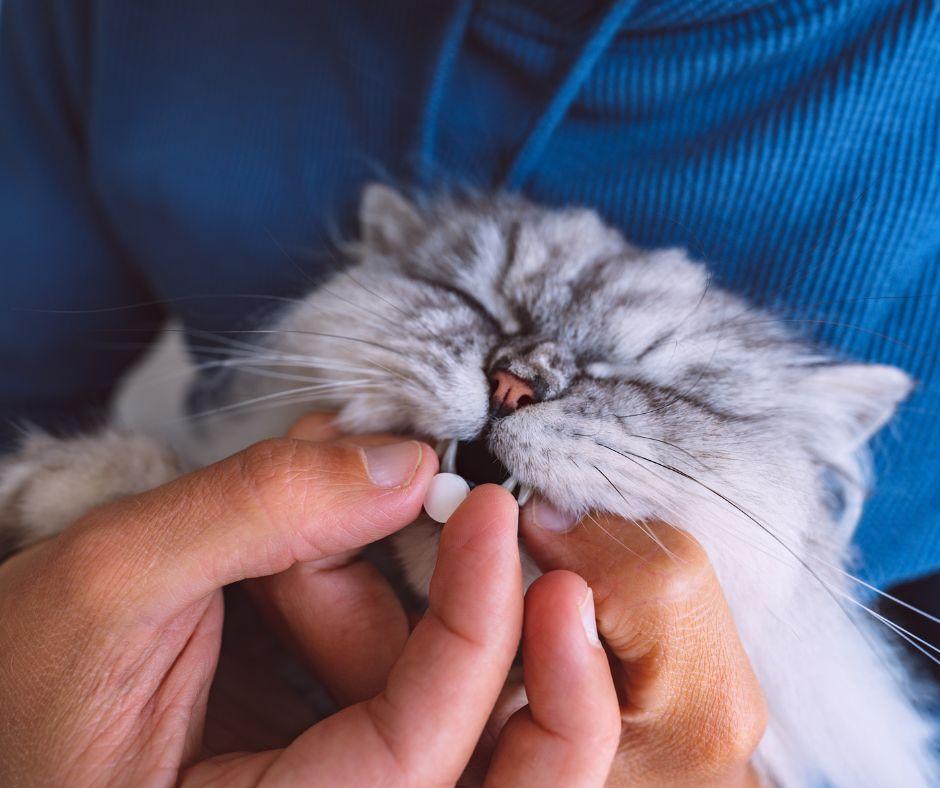
If you’re like a lot of cat owners, you know your cat’s daily routine. If you notice your cat is not following his usual activities, or if you see a change in behavior patterns, those could be subtle but important clues that your cat is sick. If you notices changes, schedule an appointment for a physical exam for your cat.
Behavioral changes are nothing to fool around with. When your cat starts to hide, instead of purring on the windowsill, it’s time to find out why. Cats are so good at hiding pain and illness, that even the smallest changes in their behavior can be a sign of a serious problem.
If one of the veterinarians at Hallett Veterinary Hospital discovers that your cat has a short term illness or an ongoing chronic health issue, your kitty may need prescription medication, and it will be your job to give it to them. Giving medication to a cat can be challenging when they don’t want to cooperate. At Hallett Veterinary Hospital, we are here to explain how you can give your cat medication successfully, without stressing out your feline friend or yourself.
Common Reasons And Prescriptions For Cat Medicine
Veterinarians prescribe medication to cats for a variety of reasons.
A common reason for giving your cat medication is for bacterial infections., Antibiotics are used for a specific period of time until the infection is gone, and your cat is up to his or her old tricks again. There is also a longer lasting, injectable antibiotic available.
In some cases, pain medications are needed to keep your cat comfortable and pain-free for a period of time..
With proper instruction from our veterinary team, you can be successful at giving your cat their medication. And at the end of the day, you know you’ve done your best to make your cat feel comfortable throughout his or her healing process.
Other common reasons your veterinarian may need to treat your cat with medications may include:
- Heart Disease
- Diabetes
- Some forms of cancer, intestinal lymphoma
- Hyperthyroidism
- IBD (Inflammatory Bowel Disease)
What To Know About Giving Your Cat Medicine
If you have ever attempted to give your cat medication, you know it can be quite a challenge for both of you. We’re here to give you some tips to get the job done right the first time, and still be buddies with your cat. Some cats may run and hide, while others may be curious. The following tips may help:
Tips On Giving your Cat Medication - Pills or Liquid
- For administering pills to your cat, you can use Pill Pockets. These are soft tasty treats that you insert the pill into to disguise the medication.
- Pillers are designed to place the pill on the back of the tongue where the cat is least likely to reject the medication.
- Some medications are available in liquid form. Your veterinarian will talk to you about dosing and how to properly administer the liquid medication. Liquids can be compounded with a flavor your cat enjoys.
If you have to medicate your cat for a long period of time, have a game plan. You will want to be prepared with a plan of action. While every cat is different when it comes to taking medications, most cats respond well to positive reinforcement when administering cat medications. Use treats and praise to help the medicine go down. You will have a quick window of opportunity to medicate your cat before he changes his mind. Trying to medicate your cat on the ground is much more difficult and tough on both of you. Place the cat comfortably on a higher table.
What To Do When You Need To Refill Your Cat's Prescription
For refills on medications, call your veterinarian. Your pet may need to have occasional blood tests to make sure he is on the correct dosage throughout the prescribed treatment.
You can also order your cat's food and medications on our online store!
What is Prescription Cat Food?
Prescription cat food is formulated for specific health issues your cat may have and can be very helpful in managing those conditions. There are certain health conditions that will benefit from prescription cat foods such as kidney disease, obesity, inflammatory bowel disease, and diabetes. These foods are formulated by veterinary nutritionists. In general, it's best to introduce a new food gradually over several days by mixing with your cat's old food in order to switch over.
Behavior Modification Medications For Cats
What should I do when my cat displays unwanted behaviors? These are often related to stress and/or anxiety.
There are a number of behavior modification medications for cats. It depends on what behaviors the cat is displaying. There are also some natural pheromones that can be used for behavior problems. A combination of behavioral medicine and behavior modification techniques is a good starting point to help your cat overcome negative behaviors.
It may take time for your cat to respond to the medication and time to learn new positive behaviors. Depending on the medication, blood tests may be performed periodically to be sure the medicine is being tolerated well.
